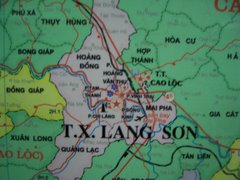One of the strangest aspects of this whole adoption marathon, journey, adventure, or whatever you want to call it: I know too much now about all kinds of strange things involving international adoption and travel, and a few other things, as well, that I never thought I would ever need to know.
Take cell phones. Our US Cellular phone would not work in Vietnam, I discovered. Too bad I just renewed the plan and bought a new phone. As our brother-in-law Tom, who works for Motorola, explained, the international standard is GSM technology. He explained that I would have to buy another phone if I wanted it to work in Vietnam. To buy the correct phone, I would also have to find out what bands they use in Vietnam. There are six band wavelengths for cell phones, and different countries use different bands. What's more, different phones are equipped with different bandwiths, as well. Tri-bands are good, with three different bands. Quad bands are better, with four. But among the three or four you have to have the right one. For Vietnam, the main bandwith turns out to be primarily 900, and so I would have to buy a GSM phone that worked on that band. It is also important to get an unlocked phone. Yes, he said, I could buy one from Ebay, as long as I could trust the phone would have the right band. Three days later I had in my hands a phone that I bought on Ebay for $50. Then I purchased a SIM card, basically a computer chip which makes the phone work and buys the phone access to a Vietnamese mobile network, for $70. With their confirmation email the company that sold me the card, Cellular Abroad, offered a $10 discount if I put a link to Cellular Abroad on my web page. That was actually the impetus to set up this blog. By the way, we could have simply purchased a phone and SIM card for Vietnam from Cellular Abroad or another vendor, for a bit more money. It remains to be seen, of course, whether our phone will actually work in Vietnam. With the more expensive phone package we might be a little bit more certain that it would work, but if we'd done that I would not know as much about cell phones.
Presumably we now have a phone number in Vietnam and a phone that will work. Incoming calls are free for us, but you will have to pay your American rates if you call.
Tonight we talked through our options on the phone (our home phone) and on email with Todd Gallinek, a travel agent in Boulder, Colorado who has specialized in adoption travel for ten years or so. On Travelocity I found various itineraries that would cost in the $3,000 range for the two of us. There were seemingly lots of flights from Chicago to Tokyo or Hong Kong, then a connection to Hanoi. Our agency said to book a return for a three-week stay, but it is important to buy an open ticket that would allow for changes in case the process takes longer than three weeks—or perhaps, if it is shorter. Todd seemed impressed with some of the options out of Chicago, except for the open-ended return. If you buy the ticket online, he noted, there’s no one at Travelocity who is going to help you make the changes you might need to make—and the airlines won’t be very helpful if you bought the ticket at Travelocity. Itineraries that piece together flights from different airlines are also dangerous because if you have to make a change and pay penalties, you might have to pay penalties to each airline. Still, I found some trips on Korean Air that seemed to work for us, especially because they flew Chicago to Seoul, then Seoul to Hanoi, in about 20 hours or so. Todd said he would check on those flights for us.
In the meantime, he put together a package on Eva Air, apparently one of his favorites. We’d fly Chicago to San Francisco, then San Francisco to Taipei, then Taipei to Hanoi. With the layovers, it would be about 27 hours total, and we would fly coach. But the return trip—the one with the two babies—held the jewels. On the long Taipei to San Francisco leg, we would fly Evergreen class, which gives us a foot rest, a head rest, and a personal television. Many of the airlines offer baby bassinettes for the long flights, which are apparently sling-like hammocks where the babies can sleep, but many simply note the request and you find out for sure if you can get one once you arrive to check in at the flight. Eva, however, confirms the bassinettes with your reservation, and he would call them first thing tomorrow morning.
We will be traveling, remember, with two five-month-olds. Confirmed bassinettes and foot rests sound like a very good feature to us.
Yes, Todd agreed, flying direct to Asia from Chicago, without a West Coast stop, might be a good thing. Korean Air is not a carrier he’s worked with, but he was willing to give them a try. He’d check into our options for changing the return, if necessary, on Korean Air. He thought he should be able to get the same fare that I was quoted on Travelocity. And while he was pretty sure they would have the bassinettes, he would check whether they would confirm the bassinettes.
I suspect we will be flying Eva.
Finally, of course, we’ve also learned a lot about international adoption—practical matters, like negotiating the process with the Department of Homeland Security and the Immigration Services, as well as philosophical and ethical matters, like why so many Americans choose to adopt from China, Vietnam, and Russia. A discussion on Paula Zahn’s evening news forum program on CNN in January created an uproar in the internet adoption community when a panelist complained that people who were adopting from China and Asia wanted high achieving, motivated, cute, porcelain doll babies, rather than darker skinned babies available through domestic programs. In fact, however, domestic adoptions, while worthwhile and rewarding, are also fraught with complications and uncertainty. Birth mothers and fathers can reclaim their children even after the adoption has been in place for years. International adoptions are much more secure, particularly so when the babies have been adopted as orphans.
Which is not to say there aren't things to think about when it comes to Americans traveling the globe to adopt babies from poorer countries. On the one hand, our adoption adventure is a remarkable testimony to the smallness of our new world, where a camera can take a picture of Maisie and Luc and we can get the pictures over the internet that day or the next. On the other hand, we are told that immediately upon leaving the airport in Hanoi we will be confronted with the poverty of Vietnam--and we will therefore have to confront our own privilege.
We have only just begun to learn about what it will mean to be adoptive parents. We have been to classes at the Family Resource Center in Chicago where we have learned about matters of attachment and developmental delays for babies after institutionalization.
We now know a lot about all kinds of things that I never thought I would know. And of course it still isn’t half of what we will know in a couple months—or even after we return from our trip in April.
Tuesday, February 27, 2007
Subscribe to:
Post Comments (Atom)









4 comments:
The Eva one definitely sounds like the way to go, even if there are so many transfers, because at least it's with the same Airline and they'll be sure to take care of you, if you miss a flight, because it's their flight that made you miss it!
I wonder if the rates are cheaper for us in the U.S. to call your Vietnam cellphone with Skype instead of our home or cell plans? I'll look into it to you, because then you could suggest that to people who you might need to call you for longer lengths of time.
Vietnam $ 0.329
Vietnam - Mobile $ 0.329
-- Skype Out rates, i.e. someone using the program Skype on their computer with a mic to call your cell phone in Vietnam
Cingular's website calculates that someone calling a cell phone in Vietnam via their cell phone would be $0.55/per minute. But that's WITH their Cingular® World Connect® feature, which is an additional $3.99/month, so the usual rate without that is no doubt higher. (source).
So it seems like it would be worth it, especially if you have to talk with let's say your travel agent or someone for an extended period.
All people would need to do is:
(1) download Skype
(2) make a Skype account (part of the download process)
(3) buy Skype credit
(4) have a working microphone
Then they could call out via Skype to your cell phone for $0.329/minute.
It's probably not that important, but I just thought I'd suggest it, because I know how you love a good deal!
ha--
So now I have to learn about Skype, too!! Well, no, Mairead's post is about using Skype to call our cell phone. But FYI Mairead and Sham have already begun to help us set up Skype on a computer so that we can use to talk with them over the internet. My first post didn't even talk about computers!
Ed
Post a Comment